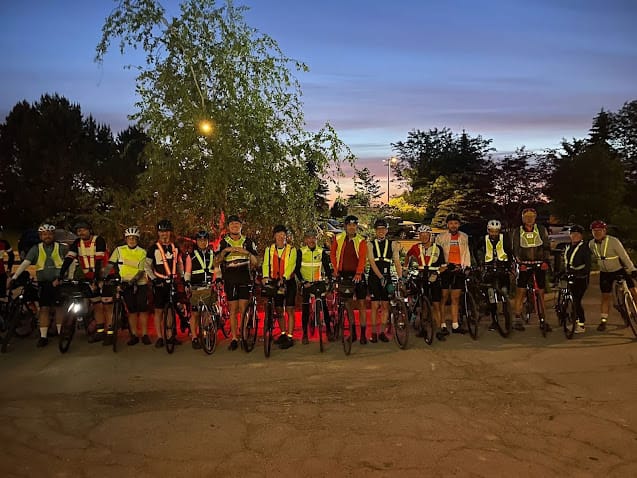Ride Your Own Ride and Other Lies
“The truth is, no one rides their own ride. Not all the way through.”

What Randonneurs Owe Each Other
June 16, 2025
We were lounging in the shade, watching ships slide up the St. Clair River like they had somewhere important to be. Fred, dressed in dark sunglasses and a face-shielding nose piece, looked like Batman between gigs. “You either DNF a hero,” he growled, “or ride long enough to become the villain.”
That was at kilometer 150, well behind the main pack. We’d started Heaven and Hill at 5 a.m. with eighteen riders, a parade for a 600 km brevet in Ontario. For the first 90 km, the peloton moved like a single organism, sharing wind and silence. It was my second-fastest 90 ever.
Then Tim flatted.
In the grand and occasionally absurd history of long-distance cycling, ride your own ride is the unofficial Rule #1. Don’t chase the guy with titanium calves. Don’t let peer pressure talk your knees into suicide. Eat when you're hungry, not when your bike computer says so. This isn't the Tour de France; no one is timing your pee breaks.
To ride your own ride is to accept that you, alone, are captain, crew, and occasionally mutinous passenger of this ill-advised voyage. Your pace, your snacks, your roadside 2 a.m. conversation with a cow – all sacred.
Ignore this rule and you’ll find yourself bonked in a ditch, hallucinating that your handlebar bag is offering life advice. Obey it, and you might finish the ride with your legs and your dignity intact.
It’s also a rule with limits. Just as you shouldn’t wreck yourself to match someone else’s pace, you can’t expect anyone to burn their reserves to drag you to the next control. This isn’t a rescue mission. Bring snacks.
But there’s an older, unspoken rule: don’t be a jerk. So we waited. Asked Tim if he needed anything. Passed tools. We eventually sent the peloton on and stayed with Tim and Brenda, both strong, competent, generous riders.
Two slow leaks and another flat later, Tim found a metal shard barely visible in the tire wall. We still weren’t concerned. We had forty hours. And each other.
That’s the odd beauty of randonneuring. It’s a fiercely individual pursuit built on a quiet ethic of mutual aid. You’re expected to be self-reliant, but you’re also expected to stop when someone’s on the roadside. No one asks. No one refuses.
Back to Heaven and Hill: we rejoined the group, drank cold brew, traded stories, then split again into the headwinds. That night the hotel smelled like someone had tried to dry hockey gear in a toaster oven. Respect is what happens when grown adults agree not to comment.
The next day, Fred and I rode together. He was struggling with the heat. I played leapfrog with him for most of the day. I stopped in the shade, watched wheat rippling in the wind, waited. I rescued a turtle that had lain down halfway across the road. I tried pep talks, jokes, silence. Eventually, he waved me on.
That moment has stayed with me.
There’s a story told in leadership workshops: The Parable of the Sadhu. Climbers in the Himalayas come across a nearly-dead holy man. They all help a little, but no one helps enough. Each assumes someone else will do the rest. They summit; the Sadhu probably doesn’t survive. Years later, one climber can’t shake the feeling they’d failed.
On the road, the dilemma is smaller but similar. How much do we owe the people we ride with? When do you stay? When do you go? What if they wave you on?
Fred wasn’t in danger. He had water, food, a plan. He was riding through his own struggle. Still, leaving him was hard.
By then, enough time had passed that I wasn’t sure I’d make it. I pushed into headwinds that felt punitive, heat that turned the road into a convection oven. Hills arrived late, vengeful and steep. I made the cutoff with an hour to spare.
Fred rolled in just before the cutoff, quiet and composed, riding his own pace with the persistent grace of someone who knows exactly what he's doing.
"Ride your own ride" sounds noble, but it’s not the whole truth. The truth is we ride with others because we know, eventually, we’ll need them to pull us through the wind, to sit beside us on a curb, to wave us on, even when they don’t want to.
What we owe each other isn’t to carry one another to the end. It’s to show up, briefly but meaningfully. To wait a little longer than necessary. And sometimes, to pretend you didn’t smell anything in the hotel room.
